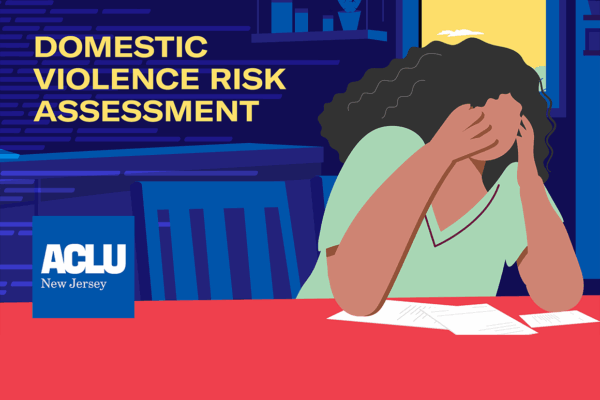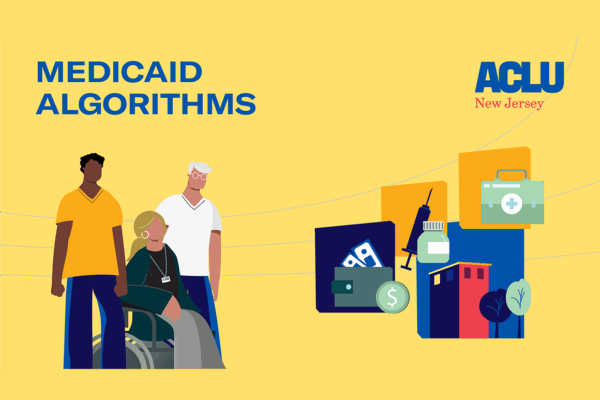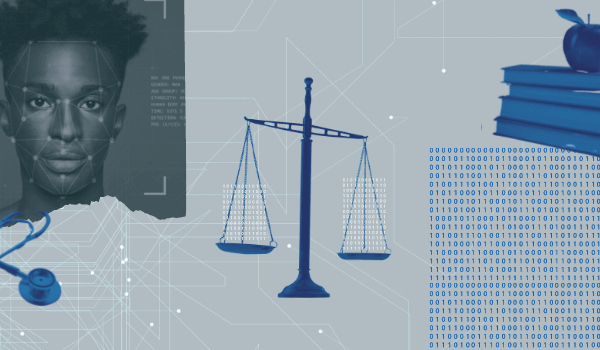Domestic violence survivors in New Jersey are eligible for special public benefits to assist in their escape and recovery from abuse. But who decides if a domestic violence survivor will be awarded those benefits? To make that determination, New Jersey turns to an algorithm.
"Strict rules place a heavy burden on survivors of domestic violence who may not be able to safely work."
The state provides vital resources to low-income people through its WorkFirst New Jersey cash assistance program, but the benefits come with a lot of strings attached – recipients of cash benefits must meet strict work requirements, cooperate with authorities seeking child support from former partners, and can only receive a maximum of 60 months of cash benefits in their lifetime.
These strict rules place a heavy burden on survivors of domestic violence who may not be able to safely work, may need more time to recover their economic independence, or who cannot meet safely with child support authorities if that puts them in contact with their abuser. Fortunately, the law recognizes how unfair these rules can be for domestic violence survivors: Under a policy called the Family Violence Option (FVO), the state can waive these rules for whoever it determines is eligible.
What does it mean to be an "eligible" domestic violence survivor?
New Jersey grants waivers for state benefit rules for certain survivors of domestic violence by relying on an algorithm – the Family Violence Option Risk Assessment – that attempts to measure the seriousness of a survivor’s past experiences with abuse or their risk of experiencing future violence.
The Family Violence Option Risk Assessment Tool is a 118-question form, administered by a professional risk assessor, covering everything from abuse experiences (“How often has your abuser threatened to hit you?”), to current safety (“Are you currently living with your abuser?”), to emotional health. Answers are converted into number scores and tallied. A high score will award the full slate of benefits, a moderate score will award a portion, and a low score yields no additional benefits at all. The tool leaves little room for open-ended exploration of the survivor’s experience. The state developed the tool in partnership with a dedicated group of domestic violence researchers who sought to capture the range of experiences of abuse that survivors might face.
But the story with any algorithm is so much more than just the tool itself. That’s why the Automated Injustice Project is investigating whether the Family Violence Option Risk Assessment in practice treats people fairly, if it respects the dignity of people who are subjected to its determinations, and if the underlying policy that the algorithm rests on is just.
Is it right to use a tool to decide who is "worthy" of our compassion?
Because there has been virtually no public reporting or study of the assessment tool, it is difficult to know how the shift to algorithmic decision-making has affected New Jersey’s benefits system and whether it treats people fairly. Transparency and accountability are made all the more difficult by the fact that benefits like WorkFirst New Jersey and the Family Violence Option are administered by each county individually.
We must not take for granted how tools like the FVO Risk Assessment fit into preexisting systems of harm. The history of our public benefits system is marked by racism and indignity, particularly in how it regards Black women and others who apply for benefits. And today, the overall state of cash assistance in New Jersey is bleak: it only reaches 16 of every 100 families that live in poverty, and that number has been declining for years, but not because there are fewer people who qualify for the benefit.
Against that backdrop, the Family Violence Option policy looks less like an expression of compassion, and more like a statement that the state only provides benefits to survivors who are “believable” survivors or are “worthy” of the state’s support and consideration. We must be willing to question the assumptions underlying both the FVO Risk Assessment tool and the underlying FVO policy and advocate for policies based less on second-guessing survivors and more on expanding resources.
Public transparency is essential to a public debate over the role of algorithms
"The history of our public benefits system is marked by racism and indignity, particularly in how it regards Black women and others who apply for benefits."
Comprehensive oversight and regulation of algorithmic systems is essential to ensure that the public understands how the government treats people. We should be able to learn whether the tool helps rather than hinders survivors’ access to benefits, whether the state wields the tool in a way that treats people fairly, and whether the dignity of domestic violence survivors who go through the assessment process is respected. Accountability and transparency in government algorithms affords New Jerseyans the opportunity to advocate for fairer and more just systems — including systems that do away with an algorithmic approach.
Through public records requests, the Automated Injustice Project has started to learn about how the state uses the Family Violence Option Risk Assessment in practice, but our work to better understand how this and other automated decision systems affect New Jerseyans is just beginning. Have you been affected by New Jersey’s Family Violence Option Risk Assessment Tool? Have other algorithms deployed by the New Jersey government impacted your life? Share your story with us.




